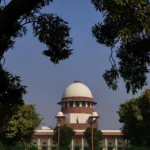In a landmark decision, India's Supreme Court has dealt a blow to political opacity by striking down the Electoral Bonds Scheme, which allowed anonymous donations to political parties. This ruling, hailed by transparency advocates, has sparked debate about its potential impact on Indian democracy.
The Electoral Bonds Scheme, introduced in 2017, aimed to curb "black money" in elections by enabling donors to purchase bearer bonds from specified banks, which could then be anonymously donated to political parties. However, critics argued that it created a loophole for opaque funding, allowing corporations and individuals with vested interests to influence elections without public scrutiny.

The 5-judge Supreme Court bench unanimously declared the scheme "unconstitutional," citing several reasons. They deemed it violative of citizens' right to know, arguing that voters have a right to information about who funds political parties to make informed choices. Additionally, the court pointed out the scheme's lack of safeguards against money laundering and its potential to disproportionately benefit large donors.
This ruling has been met with mixed reactions. Transparency advocates have lauded it as a victory for clean elections and accountability. They believe it will increase transparency in political funding, allowing voters to hold parties accountable for their sources of income. Additionally, they hope it will level the playing field by reducing the influence of large, anonymous donors.
However, some political parties and analysts have expressed concerns. They argue the ruling could discourage legitimate donations, particularly from smaller donors who might prefer anonymity. Additionally, they worry that the lack of alternative mechanisms for transparent, anonymous funding could inadvertently push donors back into the shadows, potentially fueling other forms of opaque funding.
The long-term impact of this decision remains to be seen. While it undoubtedly enhances transparency, it raises questions about the need for alternative, legal avenues for anonymous political funding that address public concerns while protecting individuals' privacy. Additionally, concerns exist regarding the implementation of the court's order and whether it will successfully achieve its intended goals.
One thing is clear: the Supreme Court's ruling has opened a new chapter in India's electoral landscape. It has reignited the debate on political funding, emphasizing the need for transparency and accountability while also raising complex questions about individual privacy and alternative funding mechanisms. The coming months will be crucial in observing how this landmark decision unfolds and its ultimate impact on Indian democracy.

